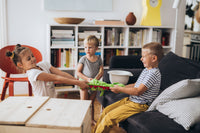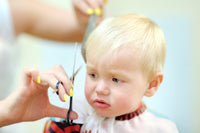By Michelle Mady
Social skills are not just for making friends. Socialization supports learning, development, critical thinking, learning abstract ideas, independence, and a sense of community. However, social skills are learned behaviors. Yes, a child’s temperament might have an influence on how they interact socially, but there is much to be learned by a toddler to achieve social skills.
Studies have shown that solid social skills in children are a metric of future success, as well as confidence and reduce stress.
So, social skills are good. But in a world where we have had limited social interactions over the past two years, how do we teach these important skills to children?
But in a world where we have had limited social interactions over the past two years, how do we teach these important skills to children?
It is always important to establish and practice social skills at home, but it is especially important with pandemic babies and toddlers. These children have not had the peer interactions that children born before 2019 or after 2021 have the opportunities to have had.
Although peer interactions are the best way for children to try out their social skills and hone in on their abilities, there are ways that adults can support this development.
Play a Game
A 2- or 3-year old may not be able to fully grasp the rules of a board game, but the rules really aren’t necessary to practice social skills. Skills, specifically, sharing and taking turns, can be practiced with total disregard for the actual rules of a game. Use games to practice taking turns, and make sure not to rush your turn! When children engage in fun activities it can be hard to wait, but doing so in small increments, like a turn based game, can make it fun and can build up a tolerance for patience in turn taking and sharing.
Work Together
Although fully cooperative play doesn’t fully develop until about 5 years of age, starting to work cooperatively can support socialization. Grab some blocks and ask your child to help you build a tower. Ask for specific pieces, for example, “Please hand me the red square.” This not only supports color and shape recognition, but also creates opportunities to practice listening skills. And listening skills are social skills! And this isn’t just for play time. Have your child help set the table, pick up toys, put away groceries or any other chore around the house. Add some social skill cues, like working together, listening and taking turns - and you’ve got a social learning opportunity!
Role Play
Parents and caregivers have to be adults almost all of the time. What if I told you being more like a toddler would help your child develop a social foundation? Next time you are on the floor playing with your child, don’t give them a turn! Tell them you are playing with something, or get sad when they take something you were playing with. Skip the mature adult reactions and tap into your inner toddler. Role playing difficult social situations can help prepare them for future peer situations.
Supporting the social skills of toddlers not only helps them to keep friendships, but also gives them the tools to become part of a community. They lead to better coping skills, self advocating behavior, and the development of self help skills that have long-term positive effects.
-
About the author: Michelle is a mom of 5 children ranging in age from 5 to 15. As a toddler and preschool teacher, she shares experiences, activities and guidance to other parents, as both a parent and as a professional early childhood educator, at any stage of their parenting journey.
Photo credit: iStock.com/fizkes




